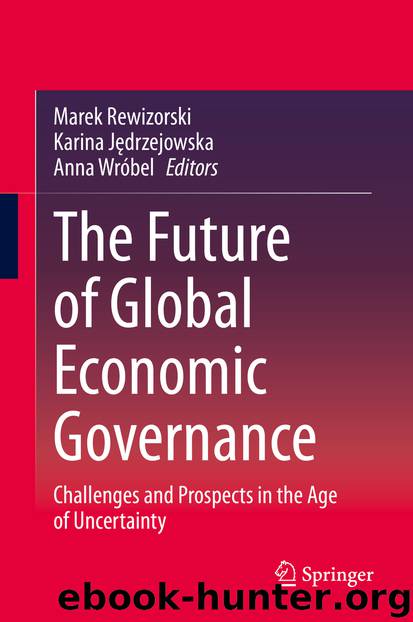The Future of Global Economic Governance by Marek Rewizorski & Karina Jędrzejowska & Anna Wróbel

Author:Marek Rewizorski & Karina Jędrzejowska & Anna Wróbel
Language: eng
Format: epub
ISBN: 9783030353360
Publisher: Springer International Publishing
2.3 Challenges for the WTO
Scholars discussed intensively possible disputes between existing and rising powers since the 2000s. They widely disagree whether rising powers so called BRIC nations such as Brazil, Russia, India, and China are to contest or accept the rules and institutions of the existing world order. Some scholars urged that BRIC nations could exercise their actions as revisionists and be a de facto threat to the existing global order, while others argued that the emerging powers would use the global order as an opportunity for them to rise by seeking incremental adaptations of existing rules and institutions (Chin 2015; Stephen 2012; Barma et al. 2014).
Focusing on the success of rising powers’ challenges that is based on an institutionalist power shift theory developed by Zangl et al., they argue that it is fully dependent on rising powers’ ability whether institutional adaptation can succeed or fail how to deal with international institutions or to make credible threats to this effect. Accordingly, it is wise to examine rising powers’ negotiations and coalition building efforts in international organizations such as the IMF, the WB, the UN in general, and the WTO in particular (Zangl et al. 2016; Heldt 2017).
The behaviors of the rising powers are regarded as similar to those of incumbent powers. In the all IOs, they approach to extract their benefits as much as possible from international cooperation, while conceding to other members their autonomy as little as possible. They also have clear preferences on how to reform global governance and structure of decision-making that influences to shape global trade governance rules (Kahler 2013).
A wrong perception of trade also threats the activity of the WTO. The role of trade and trade liberalization has been regarded as a driver of inequality and stagnation in average household incomes of the middle class in many countries. However, empirical research demonstrated that trade is not a major driver of these trends. The major drivers are primarily the results of technological change and domestic policy choices. Despite the fact, trade agreements are criticized as the major reason of inequality and low economic growth. As a result, arguments against trade agreements and trade system spread out in businesses, NGOs, and citizens more generally. Moreover, the idea and value of rules-based trade has been questioned in the WTO (Bluth and Hoekman 2018).
Different perceptions between major emerging economic powers such as China and India and existing economic powers such as OECD member nations are deep seated. The former believes that the WTO is unbalanced and treats them unfairly, while the latter regards the emerging economies engaging in trade distorting policy that is in favor of their national companies and violates fair competition in the domestic and global markets. Therefore, consumers concern about the fairness of trade whether or not they can ensure national governments to regulate economic activities in order to meet the fundamental societal goals for their economic benefits and welfares (Wu 2016).
These perceptions have raised the question confronting in the WTO how to restore trust in the global rules-based trade system.
Download
This site does not store any files on its server. We only index and link to content provided by other sites. Please contact the content providers to delete copyright contents if any and email us, we'll remove relevant links or contents immediately.
International Integration of the Brazilian Economy by Elias C. Grivoyannis(110753)
The Radium Girls by Kate Moore(12019)
Turbulence by E. J. Noyes(8040)
Nudge - Improving Decisions about Health, Wealth, and Happiness by Thaler Sunstein(7694)
The Black Swan by Nassim Nicholas Taleb(7111)
Rich Dad Poor Dad by Robert T. Kiyosaki(6613)
Pioneering Portfolio Management by David F. Swensen(6289)
Man-made Catastrophes and Risk Information Concealment by Dmitry Chernov & Didier Sornette(6007)
Zero to One by Peter Thiel(5789)
Secrecy World by Jake Bernstein(4742)
Millionaire: The Philanderer, Gambler, and Duelist Who Invented Modern Finance by Janet Gleeson(4469)
The Age of Surveillance Capitalism by Shoshana Zuboff(4279)
Skin in the Game by Nassim Nicholas Taleb(4240)
The Money Culture by Michael Lewis(4198)
Bullshit Jobs by David Graeber(4179)
Skin in the Game: Hidden Asymmetries in Daily Life by Nassim Nicholas Taleb(3993)
The Dhandho Investor by Mohnish Pabrai(3760)
The Wisdom of Finance by Mihir Desai(3735)
Blockchain Basics by Daniel Drescher(3574)
